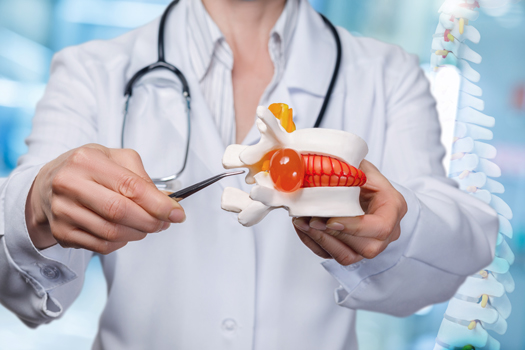
A herniated disc (sometimes referred to as a “ruptured” or “bulging” disc) is a displacement of disc material beyond the disc space. It becomes a problem if the material from the inner portion of the disc irritates a nearby nerve. Because of the many factors that can affect a damaged or out-of-place spinal disc, it's not unusual for some of the things you do or don't do to worsen radiating or localized pain and other common symptoms. Below, we take a closer look at just what could make a herniated disc worse.
Poor Posture
The way you sit, stand, and even sleep can affect how a herniated disc irritates adjacent nerves. How much your posture affects disc-related symptoms depends on where the affected spinal disc is located. If it's in the lower back area, prolonged sitting or habits like slouching or leaning to one side or the other could make a herniated disc worse.
The solution is to make an effort to improve your posture. With sitting, make an effort to get up and move as much as possible. Back support cushions and ergonomically designed office chairs can be equally beneficial, as can sleeping in a spine-neutral position on a supportive mattress.
Certain Activities
Some of your regular activities could also make a herniated disc worse. Whether or not this happens depends largely on the nature of your activities and the movements you make. You're more likely to aggravate a herniated disc with activities involving:
• Excessive bending or twisting
• The potential for direct contact with your body or spine
• Repetitive movements
If you're noticing an uptick in herniated disc symptoms after activities of this nature, consider modifying your activities. You may also benefit from using protective products such as a lumbar support belt or soft brace.
Unhealthy Diet & Exercise Habits
Your diet and exercise habits can affect the discs in your spine and the nerves around them. Certain foods, especially ones higher in sugar and trans fats, have the potential to increase inflammation and worsen herniated disc discomfort. Aim for a disc-friendly diet that includes plenty of water, lean protein, and nutrient-rich foods.
A lack of regular exercise can also contribute to worsening disc-related symptoms. This can happen as spine-supporting muscles become weaker and more stress and strain from your daily movements goes directly to your spine and its discs. Fortunately, there are many forms of exercise you can safely do even with a herniated disc, including:
• Walking on a regular basis on flat, even surfaces
• Aquatic or pool-based exercises that are easier on your spine and muscles
• Yoga and similar disciplines, since movements are slower and more controlled
Not Seeking Treatment
Finally, one other thing that could make a herniated disc worse is failing to get an accurate diagnosis and seek treatment. Thanks to the reliability of image testing and other diagnostic processes, it's often possible to accurately identify a problem disc. A doctor can then use this information to offer treatment recommendations that make it easier to manage your symptoms if herniated disc surgery isn't absolutely necessary or preferred at the moment.
If you have a herniated disc, a discectomy may be the best option. Although this is generally a very successful procedure, having a large hole in the outer ring of the disc more than doubles the risk of needing another operation. A new treatment, Barricaid, is a bone-anchored device that closes this hole, and 95 percent of Barricaid patients didn’t undergo a reoperation due to reherniation in a 2-year study timeframe. This treatment is done immediately following the discectomy—during the same operation—and doesn’t require any additional incisions or time in the hospital.
If you have any questions about the Barricaid treatment, ask your doctor or contact us at 844-288-7474.
For full benefit/risk information, please visit: https://barricaid.com/instructions.


Comments